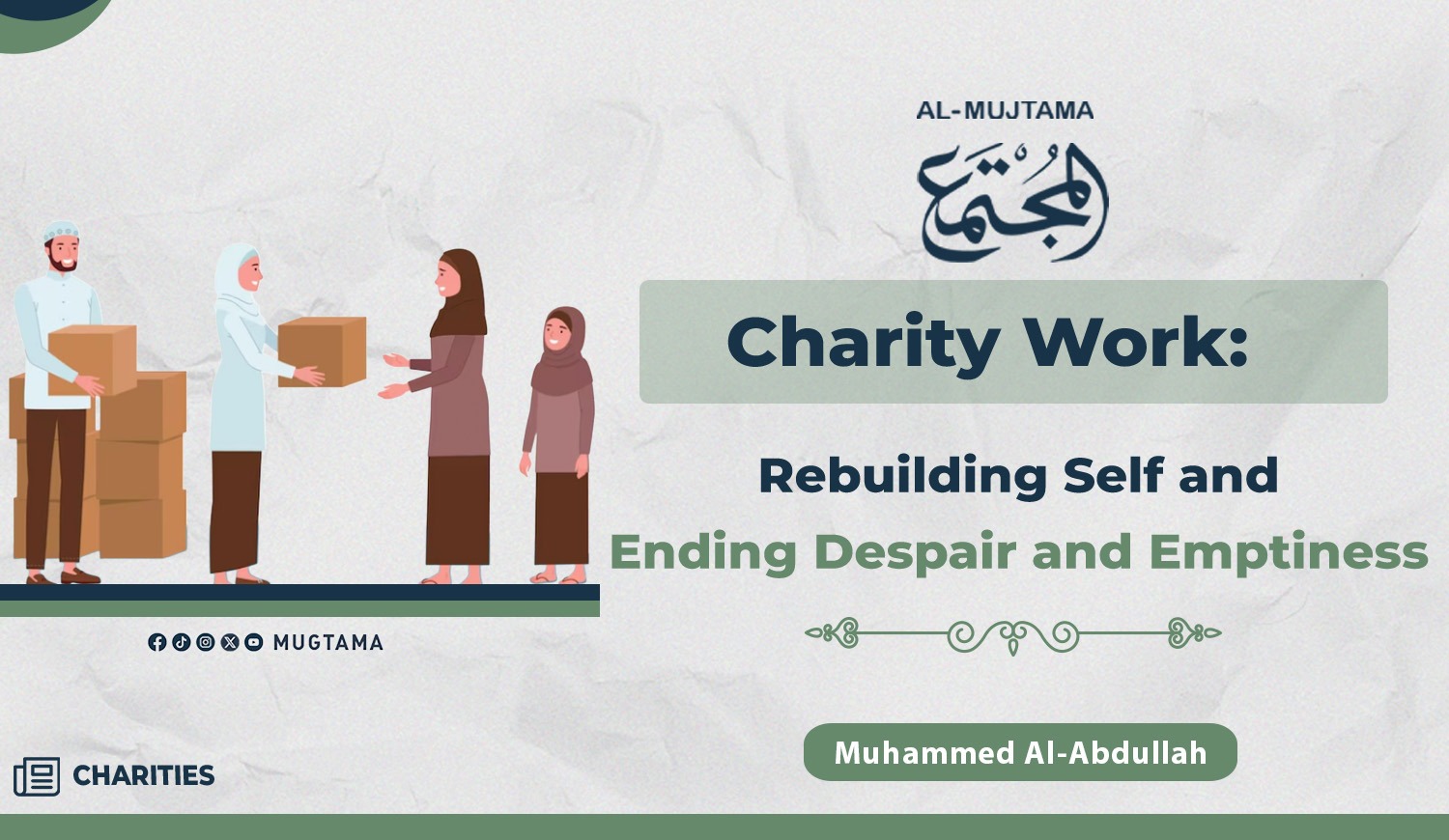Kuwait: Goodness and Giving
Charity Work: Rebuilding Self and Ending Despair and Emptiness

A wise person once said, “Yesterday is a deadline, today is
work, and tomorrow is hope.” This is an invitation to embrace a positive future
and not dwell on the past. The Quran warns against surrendering to the
bitterness of reality or replaying painful memories because it sickens the
soul. Despairing feelings feed despairing thoughts. As God Almighty says: (So
that you may not grieve over what has escaped you) (Al-Hadid: 23).
Every person, at every stage of life, seeks a sense of inner
peace and tranquility. It is what each person strives for within their family
and work. The self wavers between activity and laziness, needing to rise from
its slumps and the discouragements that affect it from time to time. The
feeling of happiness generates positive energy, especially when it comes to
doing good for others. It is narrated that a man came to the Messenger of God,
peace be upon him, and asked, “O Messenger of God, who is the most beloved of
people to God?” He replied, “The most beloved of people to God are those who
are most beneficial to people. The most beloved of deeds to God Almighty are a
joy you bring to a Muslim, or relieving a hardship from them, or paying off
their debt, or driving away their hunger. And for me to walk with my brother in
a need is more beloved to me than to seclude myself in this mosque, meaning the
Mosque of Medina, for a month.”
Acts of charity throughout life are the secret to happiness
and the best way to get rid of the frustration and despair that troubles the
soul. They also eliminate the emptiness that serves as fertile ground for the
whispers of the devil.
Experts advise the necessity of meeting new people who have
positive energy and love life. They also suggest that participating in social
activities, such as charity work, has a significant role in eliminating
emptiness and preventing despair from creeping into the soul.
Overcoming Monotony and Dwelling on
the Past
The magazine "Al-Mujtamaa" spoke with the Syrian
preacher and thinker, Abdul Karim Bakkar, who warned against the danger
of dwelling on the past and its pains at different stages of life. He said that
a person should not be like someone who spends the first half of their life
longing for the second half and spends the second half regretting the first.
This is how their life passes in vain.
The Syrian thinker mentioned in his speech that the painful
question is: "Is the problem with the times, or with the way the
generation thinks? Is the problem that life is difficult, or that determination
has become too weak to face it?"
Bakkar addressed his advice to young people, saying that we
were not created to live on the margins of life, waiting for something we do
not know. Rather, we were created to be influential, reformers, and builders of
civilization. Obstacles will not disappear, and opportunities will not wait for
you for long. Either you build yourself today, or you will remain complaining
about everything tomorrow—except yourself.
Bakkar also warned against falling into the trap of
"monotony and boredom." He said that we do not feel blessings because
we wake up in the morning, open our eyes, move without pain, eat our food, and
go about our day. Everything works as it should, but our hearts are empty of
gratitude.
He questioned why we don't give thanks. It is because when the
human mind gets used to a blessing, it stops noticing it. This phenomenon is
known in psychology as "perceptual adaptation," where the mind
ignores what doesn't change, no matter how great it is. The Quran has warned us
about this human tendency, as God Almighty said: (And few of My servants are
grateful). A blessing is not perceived by the eye of repetition but by the eye
of contemplation.
Charity Work and Filling the
Spiritual Void
For his part, Dr. Abdullah Al-Kilani, a professor at
the College of Sharia at the University of Jordan, affirmed that in light of
these challenges, charity work emerges as a powerful and effective force, not
only in providing material assistance but also in addressing the psychological
and social roots of these negative feelings from a religious, social, and
psychological perspective.
In his speech to "Al-Mujtama," he pointed out the
necessity of employing the concept of "Sunani thinking," which
emphasizes the existence of fixed laws that govern human and social life and
guide us to God's guidance in managing our affairs. He explained that Sunani
thinking indicates that there are divine laws governing the universe and human
life. Among these laws is the law of giving and taking. God Almighty has
commanded us to give and urged us to do so, and He has placed a great blessing
in it, confirming His saying in the Holy Quran: (And whatever you spend of
anything, He will compensate it; and He is the best of providers).
When a person gives from their time, money, or effort, they
not only enrich the lives of others but also their own. They find peace and
tranquility.
He added that this act of giving represents a divine mechanism
and a great act of worship to eliminate despair and emptiness for the following
reasons:
- Reviving the sense of purpose and meaning:
Many people feel despair and emptiness due to a lack of
purpose or meaning in their lives. Charity work gives them a noble purpose that
goes beyond the self. They become part of a larger movement that seeks to
improve the lives of others for the sake of God Almighty. This involvement
generates a deep sense of satisfaction and achievement and fills the spiritual
void that can result from self-absorption or purely material goals.
- Promoting social belonging in the community:
It reinforces the spirit of social solidarity and family and
community cohesion. When individuals participate in charitable initiatives,
they feel that they are an integral part of a cohesive community, contributing
to its building and well-being.
- Developing self-efficacy and self-confidence:
Seeing the positive impact of charitable contributions on the
lives of others significantly enhances an individual's self-confidence and
self-efficacy. The volunteer realizes that they can make a difference and have
the ability to give and influence.
- Transforming negative energy into positive energy:
Feelings of despair and emptiness can turn into destructive
negative energy if not channeled properly. However, charity work provides a
constructive channel to direct this energy. A Muslim does not surrender to
despair but always strives for good and reform.
The Uniqueness of Kuwaiti Society in
Charity Work
Al-Kilani confirms that Kuwaiti society has a unique and long
history in the field of charity work, given the deep-rooted values of
compassion and social solidarity, which are an integral part of its cultural
and religious identity. Charity work has always been a prominent feature in
Kuwait's history, through endowments, foundations, and charitable societies
that have been active for decades.
He added that charity work in Kuwait enjoys great support from
all segments of society, which encourages individuals to participate and gives
high social value to their efforts. It is a model that should be emulated in
our Arab and Islamic societies.
Al-Kilani praised the youth initiatives in Kuwait that have
appeared in recent years, such as beach cleanup campaigns, initiatives to
support needy families, or providing tutoring for students who cannot afford
it.
These initiatives are based on the passion and enthusiasm of young people for giving and indicate the spirit of giving rooted in this generation. Additionally, there are influential individuals. Many Kuwaiti personalities have dedicated their lives to charity work and have become role models for others. Their inspiring stories confirm how one person can make a huge difference in the lives of thousands.











